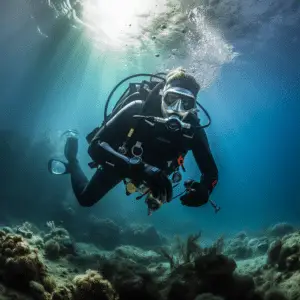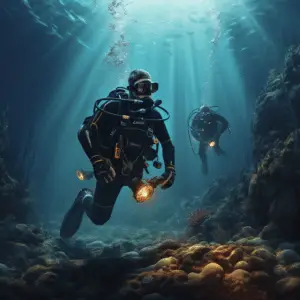Scuba Diver Safety, When you think about Scuba divers, you may just imagine people throwing themselves into the water and exploring freely. However, this really isn’t the case as a lot of work needs to be put in before someone is even allowed to ascend into the water.
Diving is an exciting sport, but it is also extremely dangerous. Because of this, you are not allowed to even dive without being a trained professional or having a trained professional with them, which shows just how risky the activity really is. Safety should be the main priority of any scuba diver, but what exactly should scuba divers do for their own safety?
Are you Fit Enough to Scuba
Scuba Diver Safety, Scuba diving is popular, but you should first check your fitness. Although scuba diving requires long durations of activity, you don’t need Olympic fitness.
There aren’t any breaks in scuba, when you’re underwater you can’t take a five-minute break for a quick drink and a rest.
You need to be able to be on the move at any given moment and if you are unable to do this, you could compromise your own safety as well as the safety of other people that you choose to scuba with. A good way to know whether or not you’re up for scuba is by heading down to your local pool and working on your underwater swimming.
If you struggle to confidently do that at a pool, imagine how much harder it would be if you had a long list of scuba equipment on top of you too.
Training
Scuba Diver Safety, If you feel like you are up to the task of scuba diving, you can’t just decide to buy the equipment and head to the water yourself.
You need to make sure that you have all of the training that you need to ensure your own safety.
There are usually a lot of local scuba companies that will give you an intensive course on everything that you need to know about scuba, like what SCUBA stands for and what techniques you have to master in order to be a scuba diving expert.
An instructor will take you into the water and supply all the equipment you need to accomplish it independently as part of your training.
Take note of all their suggestions and what brand of equipment they like, as skilled professionals usually know the best and safest equipment.
Equipment
The main thing that any scuba diver depends on to keep them safe is having the right equipment.
Once you are underwater, you are completely dependent on your equipment to make sure that you stay as safe as you can.
Because of this, it is important that you invest in some good kit. Here are general rules that scuba divers follow when it comes to getting their own equipment.
No second hand
Though second-hand equipment may seem alluring due to its low prices, you really can’t put a price on your own safety.
A good scuba diver will try and get all the equipment they can brand new. This means that there is no potential wear and tear that could present itself in the worst possible time.
New equipment lasts longer, so you won’t have to buy it again as often, saving you money over time. More modern technologies will make the new equipment better than prior generations and make scuba diving easier.
Test run
Though buying new equipment is excellent, you shouldn’t wait to utilize it until you go scuba diving. Scuba diving is dangerous since anything may go wrong, no matter the brand. If an object has hidden damage or is defective, it’s better to discover out in shallow water than 20 meters underwater. You may run many tests to make sure your equipment is working properly, which could save your life if you acquired faulty equipment.
Don’t go cheap
This advice is not too dissimilar to the advice about not buying second hand. Even if you are buying brand new products, you really don’t want to go for the cheapest option on the market. This is for a number of reasons. As mentioned, cheaper things may not last as long, so you’ll have to buy them again, costing you more money. You don’t want to deal with malfunctioning or ineffective cheap objects in the water.
Shop around
When it comes to purchasing equipment, scuba divers often shop around and ask for recommendations about brands before they settle on some equipment.
This means that they are buying a brand that they know will work and will keep them safe.
If you aren’t sure where to look, don’t worry as there are plenty of comparisons between brands online for every bit of equipment you could need.
Like the best snorkels for under $100 and reviews of dive watches under $1500, there are plenty of resources online.
Diver down flags
Scuba divers also use a diver down flags when they do go out on diving excursions.
The sea can be quite a hectic place as there are a number of different sports that people do out on the ocean.
The sea is also used as a means of travel, so there are usually plenty of boats on the water. Having a diver down flag indicates that you are diving underneath the flag and it stops people from driving boats over that location, ensuring the safety of the diver.
Planning the dive ahead of time
Another way that scuba divers ensure their safety is by planning the dive ahead of time. They decide where, how deep, and how long to dive. Running out of oxygen is a major safety concern for scuba divers. By planning their dive, they know just how much oxygen they will need. It is incredibly important that these plans are followed, as if you go too deep you may run out of oxygen sooner and put yourself in danger.
Diving with a buddy
Unless someone has years of experience, it is rare that you will find someone diving alone. Diving is unexpected, therefore a partner provides security. Someone can also check your equipment’s connections and invisible functions.
It also means that you have companionship when diving which is always nice.


